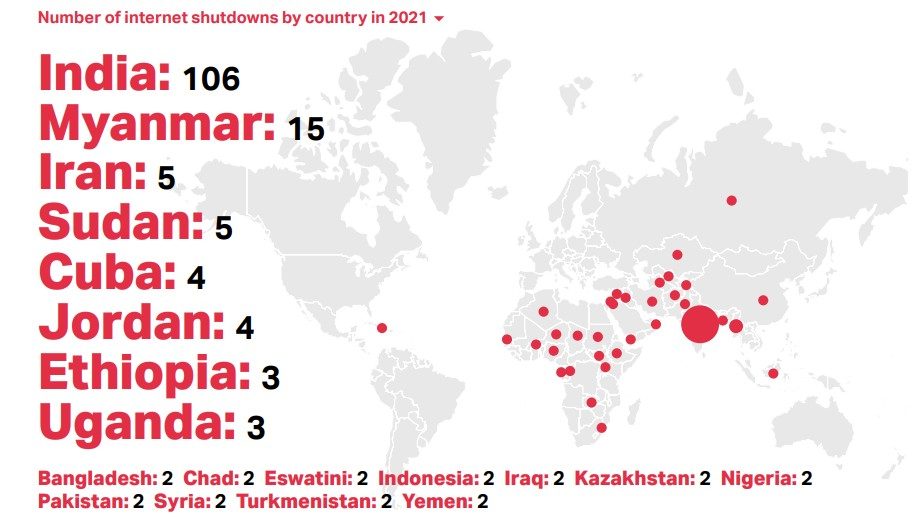SUMMARY
This is AI generated summarization, which may have errors. For context, always refer to the full article.

MANILA, Philippines – Digital civil rights non-profit Access Now on Thursday, April 28, released their report on government-sponsored internet shutdowns in 2021. The annual report is part of the group’s #KeepItOn campaign, which seeks to put an end to internet shutdowns that prevent people from accessing valuable information, especially at crucial times such as protests, rallies, elections, and conflict.
The group defines internet shutdowns as the “intentional disruption of internet or electronic communications, rendering them inaccessible or effectively unusable, for a specific population or within a location, often to exert control over the flow of information.”
“It is typically governments that order them, and types of shutdown include ‘blanket’ shutdowns (cutting access entirely), slowing access (‘throttling’), and blocking communications platforms like messaging apps. People also refer to shutdowns as ‘blackouts,’ ‘kill switches,’ or ‘network disruptions.’”
The 2021 study found five trends: prolonged shutdowns; more disruptions to mobile internet during protests; targeted blocking of communications platforms; combining the use of throttling, blocking, and network shutdowns; and shutdowns targeted to specific locations and populations.
“At the halfway mark in 2021, we had already documented the continuation of a deeply damaging trend: some governments are prolonging their interference, further exacerbating the devastating harm they have on people’s lives,” said the report. The longest shutdown documented in 2021 was the Former Federally Administered Tribal Area (FATA) of Pakistan, lasting 2,026 days from June 12, 2016 to December 28, 2021.
In one instance, a government would restore internet services but would impose shutdowns intermittently. This was found to have happened in India’s Jammu and Kashmir regions were authorities would “impose shutdowns intermittently, with 85 documented disruptions in total in 2021 – leaving the population in a near-constant state of compromised connectivity.”
Protests are a target for shutdowns too, particularly mobile internet access. Eighteen governments were found to have cut mobile internet during protests in 2021 including Bangladesh, Burkina Faso, Chad, Cuba, Eswatini, India, Indonesia, Iran, Iraq, Jordan, Kazakhstan, Myanmar, Pakistan, Senegal, South Sudan, Sudan, Turkmenistan, and Uganda. There were 37 instances of this type of shutdown in 2021, more than doubling from 15 in the previous year.
“With more and more people turning to their mobile phones to access the internet and digital communication, platforms globally, and particularly in developing and emerging countries, state actors have identified mobile internet shutdowns as an effective way to silence people without necessarily having to take the entire country off the grid,” the study noted.
“Authorities may also target mobile services in an attempt to silence their critics, who might otherwise find and share information privately, and connect with one another to organize, using certain mobile platforms or applications, such as social media apps, secure messaging apps, or VPNs.”
Targeted blocking
Authorities targeting key communication platforms such as Twitter and Facebook continued in 2021, with the report finding instances in 22 countries through 2021.
Facebook is the biggest target, having been blocked 21 times in 17 countries in the past year, followed by WhatsApp (16 times blocked) and Twitter (13 times blocked).
Virtual private networks (VPNs), which sometimes allows users to circumvent the blocking of services and apps, have also been a target of restrictions.

Among the most extreme examples of targeted blocking occurred in Nigeria, the study said: “But perhaps the most eye-opening example of the trend in 2021 was Nigeria’s blocking of Twitter. After Twitter deleted a tweet by Nigerian President Muhammadu Buhari threatening genocide on Nigerian citizens in the south, the government blocked the platform for a full seven months.” Twitter was also blocked in Myanmar as part of the military’s ongoing digital coup, and was throttled in Russia.
China also blocked Signal in 2021, after seeing an increase in downloads of the app that year. Newer audio-based platform Clubhouse was also blocked in Jordan and Oman, which was being used in the countries for public online debates.
‘Hiding’ internet shutdowns through throttling
The study also found instances where authorities combined throttling with other types of shutdowns.
“Throttling is the act of artificially restricting, but not stopping, the flow of data through a communications network. Throttling makes it appear as though internet access or a platform or service is available, but the level of interference is enough to render the service or resource effectively useless,” the study explained.
It said that throttling can be used to “hide” a shutdown by not completely cutting access, and instead just making access slow and difficult. : Algeria, India, Iran, Iraq, Myanmar, Jordan, Russia, and Uganda were found to have throttled services in 2021.
“In many parts of the world, due to poor network infrastructure, it can be difficult to distinguish between deliberate throttling and slow internet connections. So throttling can be a way to ‘hide’ an internet shutdown in plain sight. This may be one reason many governments turn to throttling: it can be excused as a technical difficulty or infrastructural failure, even if the real reason is to crush a protest or interfere with elections.”
Governments were also seen targeting shutdowns specifically by region and location, or to specific individuals. Of the 182 shutdowns imposed by governments worldwide in 2021, 118 were restricted to one location or locations within the same state or province.
“While a more targeted shutdown sounds like it would be less damaging, they are often a sign that a government is trying to silence a specific population, further marginalizing already vulnerable communities. These targeted shutdowns also tend to last longer and have a devastating impact on the human rights of those living in the shadows, disconnected from one another and the rest of the world,” the study said. – Rappler.com
Add a comment
How does this make you feel?
There are no comments yet. Add your comment to start the conversation.